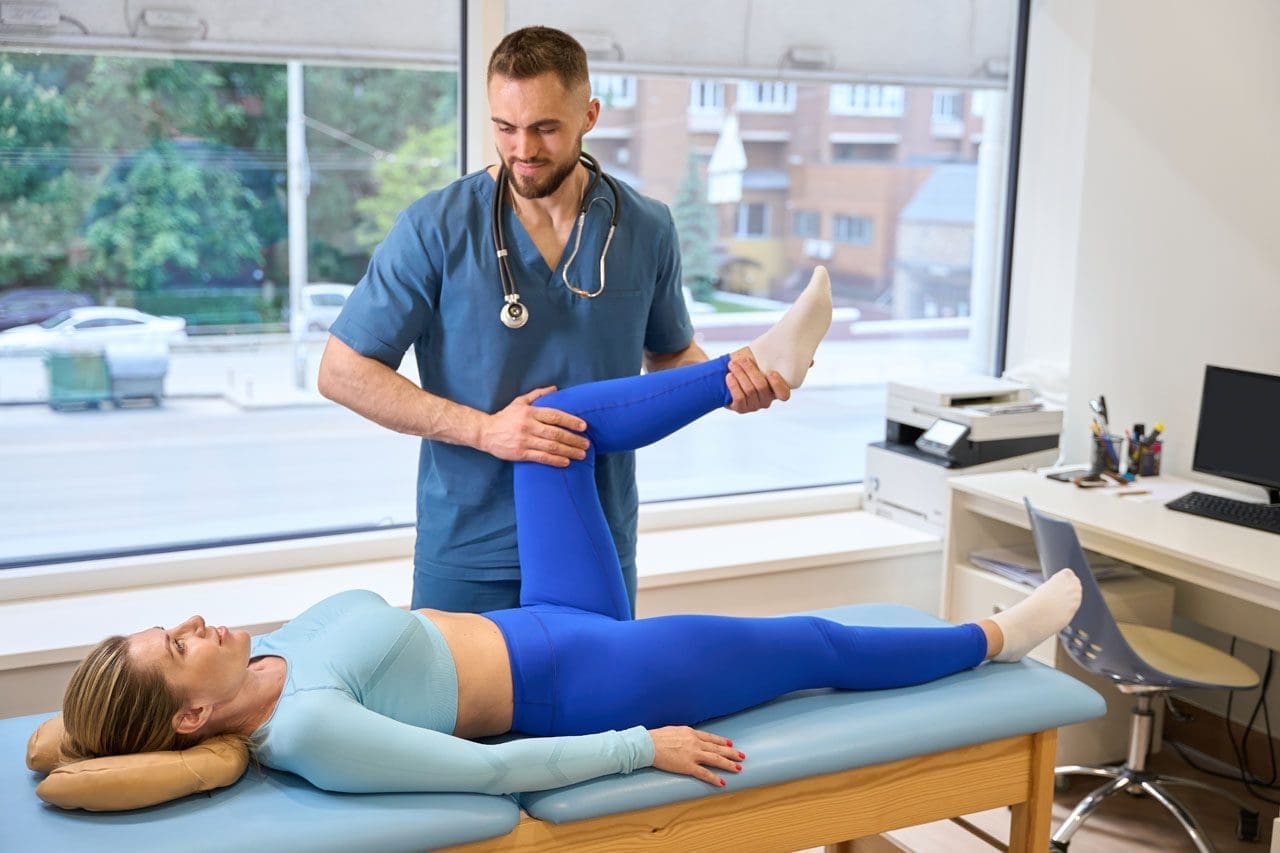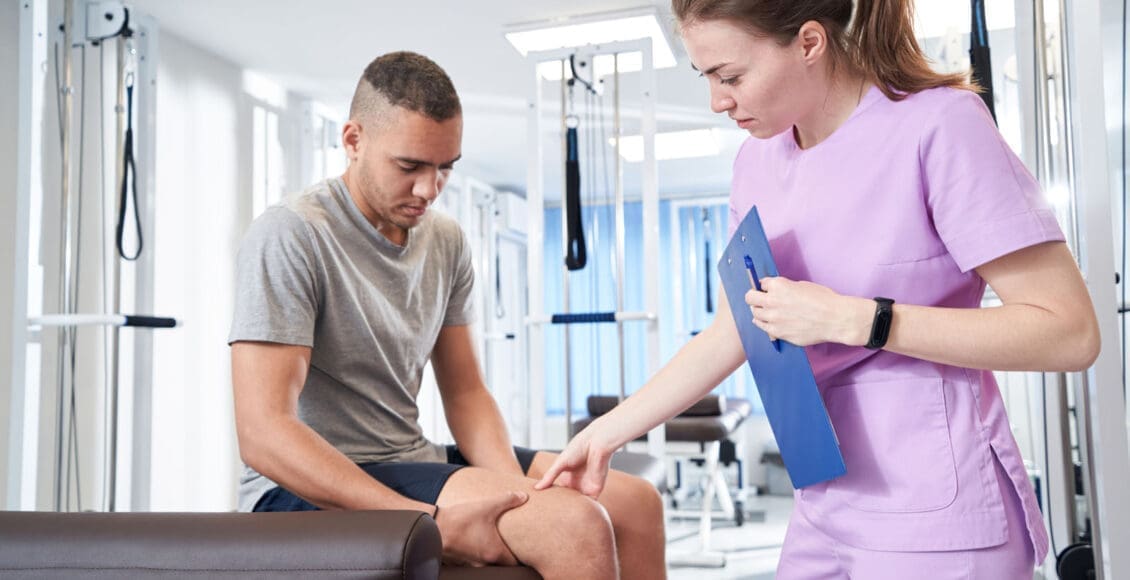Can incorporating stretches and exercises help relieve pain and provide more support for individuals with knee pain?

Table of Contents
Knee Strengthening
The knee is the largest joint connecting the shin and thigh bones. Its cartilage, muscles, ligaments, and nerves all play a role in maintaining the joint’s health and movement. Individuals of all ages can experience knee pain, but it is more common in those with labor-intensive jobs, arthritis, and athletes. A healthcare provider will prescribe targeted stretches and exercises for individuals with pain, inflammation, or a health disorder that affects the strength of their knees to relieve knee pain while strengthening the muscles around the joint. Knee stretches and exercises are great for those with sore knees and knee pain or stiffness, but they can also be used as preventative medicine.
Exercise Benefits
Doing knee-strengthening exercises can significantly improve joint health. The benefits associated with exercises include (Zeng C. Y. et al., 2021)
- Reduced pain, stiffness, and joint dysfunction.
- Reduced inflammation.
- Improved mobility.
- Improved strength.
- Cartilage degeneration prevention.
- Bone loss prevention.
Leg Lifts
Leg lifts are done by lying on the back with one leg bent and the other fully extended. To perform the exercise: (American Academy of Orthopaedic Surgeons, 2009)
- Raise the extended leg, keeping it straight.
- Hold for three to five seconds once the leg is elevated roughly one foot off the floor.
- Lay it back down to rest.
- Repeat the exercise 20 times for each leg.
What To Avoid
When performing the single-leg lift, there are certain things to avoid as they can lead to other issues or injuries. This includes: (American Academy of Orthopaedic Surgeons, 2009)
- Arching the back
- Flexing the neck
- Moving too quickly through the motion.
- Using momentum instead of the muscles.
To know the exercise is being performed correctly, individuals should feel it in the front of their thighs.
Hamstring Stretch on a Bench
If a weight bench is available, doing hamstring stretches can help strengthen the knee. To perform this stretch:
- Sit straight on the bench, with one leg straight out and the other planted on the floor.
- With the knee straight, hinge over from the hips, keeping a straight, neutral spine.
- Slowly push the chest towards the leg straight out on the bench. Hold for 15 to 30 seconds.
This exercise helps with overall strength, stamina, and balance. (Kothawale S. Rao K. 2018) (Wang H. et al., 2016)
What To Avoid
Avoid curving the spine to get closer to the thigh during the stretch. The key is not how far you can bend down but getting a deep stretch. Individuals not yet flexible enough to go all the way down should bend until comfortable but can still feel the stretch in their hamstrings. With practice and time, flexibility will improve. This stretch should be felt in the hamstrings.
Step Exercises
Step exercises, or step-ups, involve using a platform at least 6 inches high. To perform the exercise:
- Put one foot onto the platform and use that leg to lift the other foot off the floor.
- Hold the position with the foot hanging loosely for 3 to 5 seconds, then place the foot back on the floor.
- Repeat each motion 20 times on each leg. (American Academy of Orthopaedic Surgeons, 2009)
What To Avoid
Avoid locking the knees when stepping up on the platform. Locking the knees switches off the muscles that need strengthening (American Academy of Orthopaedic Surgeons, 2009). Step exercises work out various areas of the leg. Individuals should feel this exercise in the thigh, hip, and buttocks.
Post-Exercise Stretching
Post-exercise stretching is vital in physical rehabilitation and strengthening. Stretching after exercise, individuals can (Afonso J. Clemente. et al., 2021)
- Relieve and reduce soreness.
- Expedite recovery times.
- Increase range of motion.
- Strengthen the knees more quickly and effectively.
Post-exercise stretches for knee pain and weakness can include:
Quadricep Stretch
This stretch targets the quad muscles located in the thighs. To perform this stretch:
- Stand with the feet planted flat on the floor, spaced the same width as the shoulders.
- Bending the left knee, grab the foot with the left hand and pull the heel toward the buttocks.
- Hold for 5 to 10 seconds.
- Repeat on both sides.
What to Avoid
There is no need to pull the heel too far into the buttocks. The goal is to feel a deep stretch. Pushing it too far can lead to injury. (Lee J. H. et al., 2021)
Toe Touches
Toe touches will help stretch calve muscles and hamstrings. To perform this stretch:
- Sit on the floor with the legs straight out in front.
- Bend the body over the legs at the hips, reaching for the toes in front while maintaining a straight back.
- Relax the shoulders and keep them away from the ears.
- Once touching the toes, hold the stretch for 15 seconds.
What To Avoid
Individuals who cannot yet touch their toes should perform the same steps and reach only as far as is comfortably possible. Over time, flexibility will improve. (Lee J. H. et al., 2021)
Injury Medical Chiropractic Clinic
These are examples of exercises and stretches that a physical therapy and chiropractic team may prescribe. Each case is different and requires reviewing individual medical history and physical examination to determine the proper treatment program. Injury Medical Chiropractic and Functional Medicine Clinic works with primary healthcare providers and specialists to develop a personalized treatment program through an integrated approach to treating injuries and chronic pain syndromes, improving flexibility, mobility, and agility to relieve pain and help individuals return to normal activities. If other treatments are needed, Dr. Jimenez has teamed up with top surgeons, clinical specialists, medical researchers, and rehabilitation providers to provide the most effective treatments.
Knee Pain Rehabilitation
References
Zeng, C. Y., Zhang, Z. R., Tang, Z. M., & Hua, F. Z. (2021). Benefits and Mechanisms of Exercise Training for Knee Osteoarthritis. Frontiers in physiology, 12, 794062. https://doi.org/10.3389/fphys.2021.794062
American Academy of Orthopaedic Surgeons. OrthoInfo. (2009). Knee exercises. https://orthoinfo.aaos.org/en/staying-healthy/knee-exercises/
Kothawale S. and Rao K. (2018). Effectiveness of positional release technique versus active release technique on hamstrings tightness. Int J Physiother Res., 6(1), 2619-2622. https://doi.org/https://dx.doi.org/10.16965/ijpr.2017.265
Wang, H., Ji, Z., Jiang, G., Liu, W., & Jiao, X. (2016). Correlation among proprioception, muscle strength, and balance. Journal of physical therapy science, 28(12), 3468–3472. https://doi.org/10.1589/jpts.28.3468
Afonso, J., Clemente, F. M., Nakamura, F. Y., Morouço, P., Sarmento, H., Inman, R. A., & Ramirez-Campillo, R. (2021). The Effectiveness of Post-exercise Stretching in Short-Term and Delayed Recovery of Strength, Range of Motion and Delayed Onset Muscle Soreness: A Systematic Review and Meta-Analysis of Randomized Controlled Trials. Frontiers in physiology, 12, 677581. https://doi.org/10.3389/fphys.2021.677581
Lee, J. H., Jang, K. M., Kim, E., Rhim, H. C., & Kim, H. D. (2021). Effects of Static and Dynamic Stretching With Strengthening Exercises in Patients With Patellofemoral Pain Who Have Inflexible Hamstrings: A Randomized Controlled Trial. Sports health, 13(1), 49–56. https://doi.org/10.1177/1941738120932911
Post Disclaimer
Professional Scope of Practice *
The information on this blog site is not intended to replace a one-on-one relationship with a qualified healthcare professional or licensed physician and is not medical advice. We encourage you to make healthcare decisions based on your research and partnership with a qualified healthcare professional.
Blog Information & Scope Discussions
Welcome to El Paso's Premier Wellness and Injury Care Clinic & Wellness Blog, where Dr. Alex Jimenez, DC, FNP-C, a board-certified Family Practice Nurse Practitioner (FNP-BC) and Chiropractor (DC), presents insights on how our team is dedicated to holistic healing and personalized care. Our practice aligns with evidence-based treatment protocols inspired by integrative medicine principles, similar to those found on this site and our family practice-based chiromed.com site, focusing on restoring health naturally for patients of all ages.
Our areas of chiropractic practice include Wellness & Nutrition, Chronic Pain, Personal Injury, Auto Accident Care, Work Injuries, Back Injury, Low Back Pain, Neck Pain, Migraine Headaches, Sports Injuries, Severe Sciatica, Scoliosis, Complex Herniated Discs, Fibromyalgia, Chronic Pain, Complex Injuries, Stress Management, Functional Medicine Treatments, and in-scope care protocols.
Our information scope is limited to chiropractic, musculoskeletal, physical medicine, wellness, contributing etiological viscerosomatic disturbances within clinical presentations, associated somato-visceral reflex clinical dynamics, subluxation complexes, sensitive health issues, and functional medicine articles, topics, and discussions.
We provide and present clinical collaboration with specialists from various disciplines. Each specialist is governed by their professional scope of practice and their jurisdiction of licensure. We use functional health & wellness protocols to treat and support care for the injuries or disorders of the musculoskeletal system.
Our videos, posts, topics, subjects, and insights cover clinical matters and issues that relate to and directly or indirectly support our clinical scope of practice.*
Our office has made a reasonable effort to provide supportive citations and has identified relevant research studies that support our posts. We provide copies of supporting research studies available to regulatory boards and the public upon request.
We understand that we cover matters that require an additional explanation of how they may assist in a particular care plan or treatment protocol; therefore, to discuss the subject matter above further, please feel free to ask Dr. Alex Jimenez, DC, APRN, FNP-BC, or contact us at 915-850-0900.
We are here to help you and your family.
Blessings
Dr. Alex Jimenez DC, MSACP, APRN, FNP-BC*, CCST, IFMCP, CFMP, ATN
email: coach@elpasofunctionalmedicine.com
Licensed as a Doctor of Chiropractic (DC) in Texas & New Mexico*
Texas DC License # TX5807
New Mexico DC License # NM-DC2182
Licensed as a Registered Nurse (RN*) in Texas & Multistate
Texas RN License # 1191402
ANCC FNP-BC: Board Certified Nurse Practitioner*
Compact Status: Multi-State License: Authorized to Practice in 40 States*
Graduate with Honors: ICHS: MSN-FNP (Family Nurse Practitioner Program)
Degree Granted. Master's in Family Practice MSN Diploma (Cum Laude)
Dr. Alex Jimenez, DC, APRN, FNP-BC*, CFMP, IFMCP, ATN, CCST
My Digital Business Card


